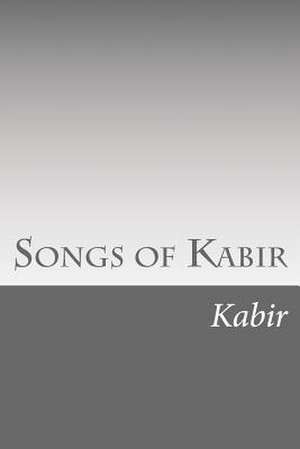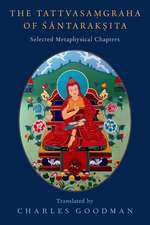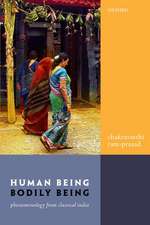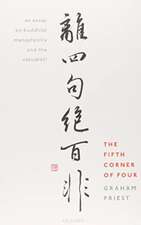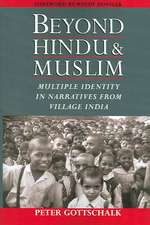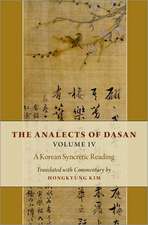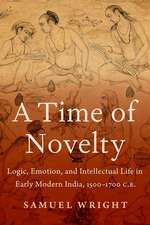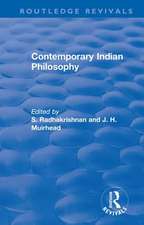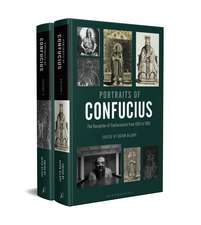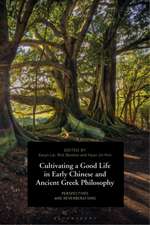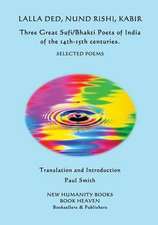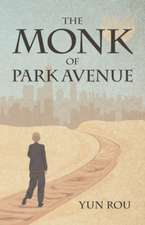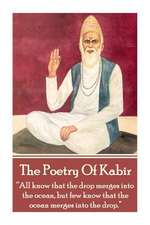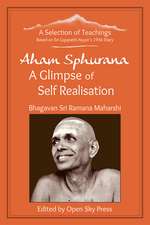Songs of Kabir
Autor Kabiren Limba Engleză Paperback
| Toate formatele și edițiile | Preț | Express |
|---|---|---|
| Paperback (5) | 56.99 lei 6-8 săpt. | |
| Weiser Books – 30 sep 2002 | 85.13 lei 3-5 săpt. | |
| NEW YORK REVIEW OF BOOKS – 31 mar 2011 | 87.22 lei 3-5 săpt. | +18.30 lei 10-14 zile |
| Lector House – 9 mar 2020 | 56.99 lei 6-8 săpt. | |
| COSIMO CLASSICS – 30 noi 2010 | 58.67 lei 6-8 săpt. | |
| TREDITION CLASSICS – 31 oct 2011 | 184.81 lei 6-8 săpt. | |
| Hardback (1) | 123.64 lei 6-8 săpt. | |
| COSIMO CLASSICS – 30 noi 2010 | 123.64 lei 6-8 săpt. |
Preț: 46.18 lei
Nou
Puncte Express: 69
Preț estimativ în valută:
8.84€ • 9.25$ • 7.31£
8.84€ • 9.25$ • 7.31£
Carte indisponibilă temporar
Doresc să fiu notificat când acest titlu va fi disponibil:
Se trimite...
Preluare comenzi: 021 569.72.76
Specificații
ISBN-13: 9781501007996
ISBN-10: 1501007998
Pagini: 68
Dimensiuni: 152 x 229 x 4 mm
Greutate: 0.1 kg
Editura: CREATESPACE
ISBN-10: 1501007998
Pagini: 68
Dimensiuni: 152 x 229 x 4 mm
Greutate: 0.1 kg
Editura: CREATESPACE
Notă biografică
Kabir, the North Indian devotional or bhakti poet, was born in Benares (now Varanasi) and lived in the fifteenth century. Next to nothing is known of his life, though many legends surround him. He is said to have been a weaver, and in his resolutely undogmatic and often riddling work he debunks both Hinduism and Islam. The songs of this extraordinary poet, philosopher, and satirist, who believed in a personal god, have been sung and recited by millions throughout North India for half a millennium.
Arvind Krishna Mehrotra is the author of four books of poetry, the editor of The Oxford India Anthology of Twelve Modern Indian Poets and Collected Poems in English by Arun Kolatkar, and the translator of The Absent Traveller: Prakrit Love Poetry. A volume of his essays, Partial Recall: Essays on Literature and Literary History will be published in 2011. He is a professor of English at the University of Allahabad and lives in Allahabad and Dehra Dun.
Wendy Doniger [O’Flaherty] graduated from Radcliffe College and received her Ph.D. from Harvard University and her D.Phil. from Oxford University. She is the Mircea Eliade Distinguished Service Professor of the History of Religions at the University of Chicago and the author of many books, most recently The Bedtrick: Tales of Sex and Masquerade, The Woman Who Pretended to Be Who She Was, and The Hindus: An Alternative History..
Arvind Krishna Mehrotra is the author of four books of poetry, the editor of The Oxford India Anthology of Twelve Modern Indian Poets and Collected Poems in English by Arun Kolatkar, and the translator of The Absent Traveller: Prakrit Love Poetry. A volume of his essays, Partial Recall: Essays on Literature and Literary History will be published in 2011. He is a professor of English at the University of Allahabad and lives in Allahabad and Dehra Dun.
Wendy Doniger [O’Flaherty] graduated from Radcliffe College and received her Ph.D. from Harvard University and her D.Phil. from Oxford University. She is the Mircea Eliade Distinguished Service Professor of the History of Religions at the University of Chicago and the author of many books, most recently The Bedtrick: Tales of Sex and Masquerade, The Woman Who Pretended to Be Who She Was, and The Hindus: An Alternative History..
Recenzii
“This is a lovely book of translations of the poetry of Kabir, a truly visionary egalitarian thinker of the fifteenth century whose songs remain very alive in the folk tradition of north India. In bringing Kabir to an English-speaking audience, Arvind Krishna Mehrotra has made a major contribution to the global reach of that inspiring vision.”
—Amartya Sen
“As Rumi is to the Sufis, so Kabir is to five centuries of Indians, less an individual author than a bullet exploding through their collective poetic gene pool. Pound tried his hand at Kabir, as did Bly and Milosz, but only Arvind Krishna Mehrotra captures the true voice of his anonymity—at once ecstatic and wry.”
—Richard Sieburth
“In Arvind Krishna Mehrotra’s welcome new translation, Kabir’s songs emerge as totally fresh, full of wild energy and intensity, and both mocking and reverent.”
—Rick Simonson, Elliott Bay Book Company
“Kabir was a poet for whom the sacred was inseparable from the satiric, the erotic, the sardonic, and the absurd, and he comes alive at last in English in Arvind Krishna Mehrotra’s translation that is simultaneously a work of long scholarship and a jazz performance of the Kabir tradition.”
—Eliot Weinberger
"Arvind Krishna Mehrotra's new translation of Kabir brings the poetry of the great 15th-century Indian poet and holy man to life in English for the first time. Not that others haven’t tried: Pound, Robert Bly and, most notably, Rabindranath Tagore in 1915, with a version consisting of thees, thous and thines, delivered in a sandalwood-scented prayer-book-ese that would not have been out of place atop a teak sidetable at one of Mme. Blavatsky’s legendary seances. But it is Mehrotra who has succeeded in capturing the ferocity and improvisational energy of Kabir’s poetry"
-- August Kleinzahler, The New York Times Book Review
"Kabir's famed iconoclasm, speed of thought, slashing paradoxical style, metaphorical zest and rhetorical brilliance have rarely been rendered into English better than in Mr. Mehrotra's versions." — Chandrahas Choudhury, The Wall Street Journal
—Amartya Sen
“As Rumi is to the Sufis, so Kabir is to five centuries of Indians, less an individual author than a bullet exploding through their collective poetic gene pool. Pound tried his hand at Kabir, as did Bly and Milosz, but only Arvind Krishna Mehrotra captures the true voice of his anonymity—at once ecstatic and wry.”
—Richard Sieburth
“In Arvind Krishna Mehrotra’s welcome new translation, Kabir’s songs emerge as totally fresh, full of wild energy and intensity, and both mocking and reverent.”
—Rick Simonson, Elliott Bay Book Company
“Kabir was a poet for whom the sacred was inseparable from the satiric, the erotic, the sardonic, and the absurd, and he comes alive at last in English in Arvind Krishna Mehrotra’s translation that is simultaneously a work of long scholarship and a jazz performance of the Kabir tradition.”
—Eliot Weinberger
"Arvind Krishna Mehrotra's new translation of Kabir brings the poetry of the great 15th-century Indian poet and holy man to life in English for the first time. Not that others haven’t tried: Pound, Robert Bly and, most notably, Rabindranath Tagore in 1915, with a version consisting of thees, thous and thines, delivered in a sandalwood-scented prayer-book-ese that would not have been out of place atop a teak sidetable at one of Mme. Blavatsky’s legendary seances. But it is Mehrotra who has succeeded in capturing the ferocity and improvisational energy of Kabir’s poetry"
-- August Kleinzahler, The New York Times Book Review
"Kabir's famed iconoclasm, speed of thought, slashing paradoxical style, metaphorical zest and rhetorical brilliance have rarely been rendered into English better than in Mr. Mehrotra's versions." — Chandrahas Choudhury, The Wall Street Journal
